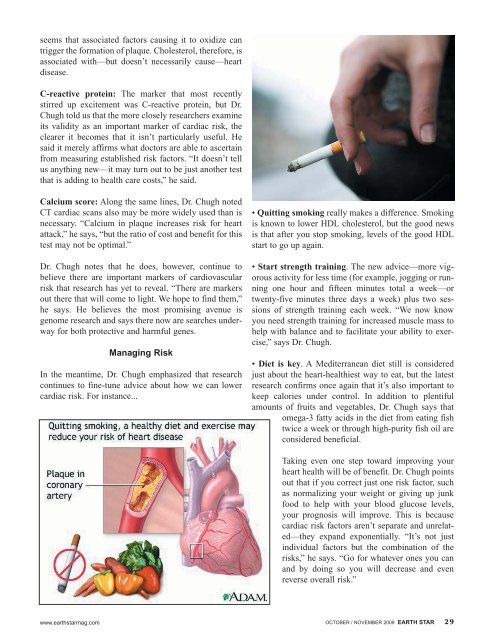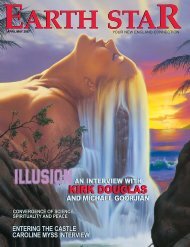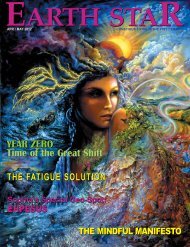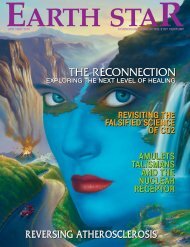WILD ATTRACTION WILD ATTRACTION - Earthstar
WILD ATTRACTION WILD ATTRACTION - Earthstar
WILD ATTRACTION WILD ATTRACTION - Earthstar
- No tags were found...
Create successful ePaper yourself
Turn your PDF publications into a flip-book with our unique Google optimized e-Paper software.
seems that associated factors causing it to oxidize cantrigger the formation of plaque. Cholesterol, therefore, isassociated with—but doesn’t necessarily cause—heartdisease.C-reactive protein: The marker that most recentlystirred up excitement was C-reactive protein, but Dr.Chugh told us that the more closely researchers examineits validity as an important marker of cardiac risk, theclearer it becomes that it isn’t particularly useful. Hesaid it merely affirms what doctors are able to ascertainfrom measuring established risk factors. “It doesn’t tellus anything new—it may turn out to be just another testthat is adding to health care costs,” he said.Calcium score: Along the same lines, Dr. Chugh notedCT cardiac scans also may be more widely used than isnecessary. “Calcium in plaque increases risk for heartattack,” he says, “but the ratio of cost and benefit for thistest may not be optimal.”Dr. Chugh notes that he does, however, continue tobelieve there are important markers of cardiovascularrisk that research has yet to reveal. “There are markersout there that will come to light. We hope to find them,”he says. He believes the most promising avenue isgenome research and says there now are searches underwayfor both protective and harmful genes.Managing RiskIn the meantime, Dr. Chugh emphasized that researchcontinues to fine-tune advice about how we can lowercardiac risk. For instance...• Quitting smoking really makes a difference. Smokingis known to lower HDL cholesterol, but the good newsis that after you stop smoking, levels of the good HDLstart to go up again.• Start strength training. The new advice—more vigorousactivity for less time (for example, jogging or runningone hour and fifteen minutes total a week—ortwenty-five minutes three days a week) plus two sessionsof strength training each week. “We now knowyou need strength training for increased muscle mass tohelp with balance and to facilitate your ability to exercise,”says Dr. Chugh.• Diet is key. A Mediterranean diet still is consideredjust about the heart-healthiest way to eat, but the latestresearch confirms once again that it’s also important tokeep calories under control. In addition to plentifulamounts of fruits and vegetables, Dr. Chugh says thatomega-3 fatty acids in the diet from eating fishtwice a week or through high-purity fish oil areconsidered beneficial.Taking even one step toward improving yourheart health will be of benefit. Dr. Chugh pointsout that if you correct just one risk factor, suchas normalizing your weight or giving up junkfood to help with your blood glucose levels,your prognosis will improve. This is becausecardiac risk factors aren’t separate and unrelated—theyexpand exponentially. “It’s not justindividual factors but the combination of therisks,” he says. “Go for whatever ones you canand by doing so you will decrease and evenreverse overall risk.”www.earthstarmag.com OCTOBER / NOVEMBER 2009 EARTH STAR 29
















